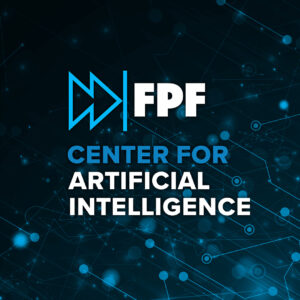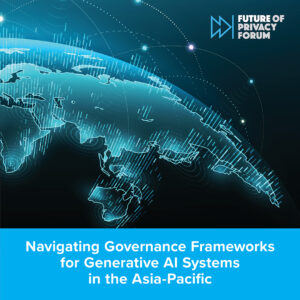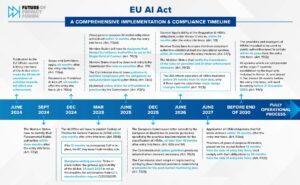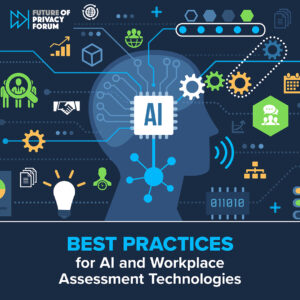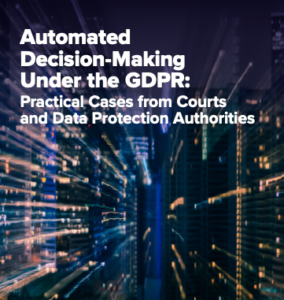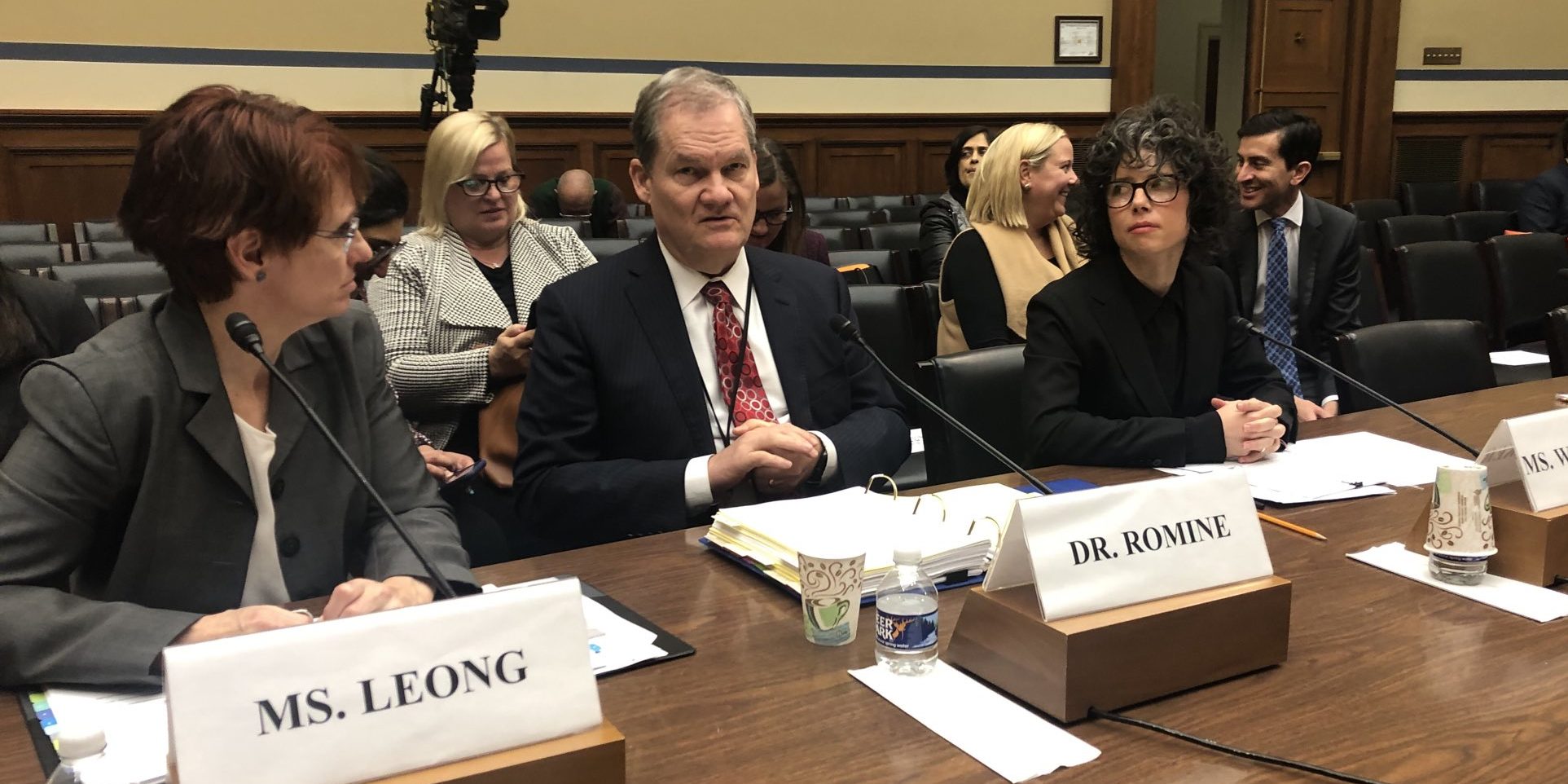The FPF Center for Artificial Intelligence: Navigating AI Policy, Regulation, and Governance
 The rapid deployment of Artificial Intelligence for consumer, enterprise, and government uses has created challenges for policymakers, compliance experts, and regulators. AI policy stakeholders are seeking sophisticated, practical policy information and analysis.
The rapid deployment of Artificial Intelligence for consumer, enterprise, and government uses has created challenges for policymakers, compliance experts, and regulators. AI policy stakeholders are seeking sophisticated, practical policy information and analysis.
This is where the FPF Center for Artificial Intelligence comes in, expanding FPF’s role as the leading pragmatic and trusted voice for those who seek impartial, practical analysis of the latest challenges for AI-related regulation, compliance, and ethical use.
At the FPF Center for Artificial Intelligence, we help policymakers and privacy experts at organizations, civil society, and academics navigate AI policy and governance. The Center is supported by a Leadership Council of experts from around the globe. The Council consists of members from industry, academia, civil society, and current and former policymakers.
FPF has a long history of AI-related and emerging technology policy work that has focussed on data, privacy, and the responsible use of technology to mitigate harms. From FPF’s presentation to global privacy regulators about emerging AI technologies and risks in 2017 to our briefing for US Congressional members detailing the risks and mitigation strategies for AI-powered workplace tech in 2023, FPF has helped policymakers around the world better understand AI risks and opportunities while equipping data, privacy and AI experts with the information they need to develop and deploy AI responsibly in their organizations.
In 2024, FPF received a grant from the National Science Foundation (NSF) to advance the Whitehouse Executive Order in Artificial Intelligence to support the use of Privacy Enhancing Technologies (PETs) by government agencies and the private sector by advancing legal certainty, standardization, and equitable uses. FPF is also a member of the U.S. AI Safety Institute at the National Institute for Standards and Technology (NIST) where it focuses on assessing the policy implications of the changing nature of artificial intelligence.
Areas of work within the FPF Center for Artificial Intelligence include:
- Legislative Comparison
- Responsible AI Governance
- AI Policy by Sector
- AI Assessments & Analyses
- Novel AI Policy Issues
- AI and Privacy Enhancing Technologies
FPF’s new Center for Artificial Intelligence will be supported by a Leadership Council of leading experts from around the globe. The Council will consist of members from industry, academia, civil society, and current and former policymakers.
FPF Center for AI Leadership Council
The FPF Center for Artificial Intelligence will be supported by a Leadership Council of leading experts from around the globe. The Council will consist of members from industry, academia, civil society, and current and former policymakers.
We are delighted to announce the founding Leadership Council members:
- Estela Aranha, Member of the United Nations High-level Advisory Body on AI; Former State Secretary for Digital Rights, Ministry of Justice and Public Security, Federal Government of Brazil
- Jocelyn Aqua, Principal, Data, Risk, Privacy and AI Governance, PricewaterhouseCoopers LLP
- John Bailey, Nonresident Senior Fellow, American Enterprise Institute
- Lori Baker, Vice President, Data Protection & Regulatory Compliance, Dubai International Financial Centre Authority (DPA)
- Cari Benn, Assistant Chief Privacy Officer, Microsoft Corporation
- Andrew Bloom, Vice President & Chief Privacy Officer, McGraw Hill
- Kate Charlet, Head of Global Privacy, Safety, and Security Policy, Google
- Prof. Simon Chesterman, David Marshall Professor of Law & Vice Provost, National University of Singapore; Principal Researcher, Office of the UNSG’s Envoy on Technology, High-Level Advisory Body on AI
- Barbara Cosgrove, Vice President, Chief Privacy Officer, Workday
- Jo Ann Davaris, Vice President, Global Privacy, Booking Holdings Inc.
- Elizabeth Denham, Chief Policy Strategist, Information Accountability Foundation, Former UK ICO Commissioner and British Columbia Privacy Commissioner
- Lydia F. de la Torre, Senior Lecturer at University of California, Davis; Founder, Golden Data Law, PBC; Former California Privacy Protection Agency Board Member
- Leigh Feldman, SVP, Chief Privacy Officer, Visa Inc.
- Lindsey Finch, Executive Vice President, Global Privacy & Product Legal, Salesforce
- Harvey Jang, Vice President, Chief Privacy Officer, Cisco Systems, Inc.
- Emerald de Leeuw-Goggin, Global Head of AI Governance & Privacy, Logitech
- Caroline Louveaux, Chief Privacy Officer, MasterCard
- Ewa Luger, Professor of human-data interaction, University of Edinburgh; Co-Director, Bridging Responsible AI Divides (BRAID)
- Dr. Gianclaudio Malgieri, Associate Professor of Law & Technology at eLaw, University of Leiden
- State Senator James Maroney, Connecticut
- Christina Montgomery, Chief Privacy & Trust Officer, AI Ethics Board Chair, IBM
- Carolyn Pfeiffer, Senior Director, Privacy, AI & Ethics and DSSPE Operations, Johnson & Johnson Innovative Medicine
- Ben Rossen, Associate General Counsel, AI Policy & Regulation, OpenAI
- Crystal Rugege, Managing Director, Centre for the Fourth Industrial Revolution Rwanda
- Guido Scorza, Member, The Italian Data Protection Authority
- Nubiaa Shabaka, Global Chief Privacy Officer and Chief Cyber Legal Officer, Adobe, Inc.
- Rob Sherman, Vice President and Deputy Chief Privacy Officer for Policy, Meta
- Dr. Anna Zeiter, Vice President & Chief Privacy Officer, Privacy, Data & AI Responsibility, eBay
- Yeong Zee Kin, Chief Executive of Singapore Academy of Law and former Assistant Chief Executive (Data Innovation and Protection Group), Infocomm Media Development Authority of Singapore
For more information on the FPF Center for AI email [email protected]
Featured
Knowledge is Power: The Future of Privacy Forum launches FPF Training Program
“An investment in knowledge always pays the best interest”–Ben Franklin Let’s make 2023 the year we invest in ourselves, our teams, and the knowledge needed to best navigate this dynamic world of privacy and data protection. I am fortunate to know many of you who will read this blog post, but for those who I […]
Five Things Lawyers Need to Know About AI
Lawyers are trained to respond to risks that threaten the market position or operating capital of their clients. However, when it comes to AI, it can be difficult for lawyers to provide the best guidance without some basic technical knowledge. This article shares some key insights from our shared experiences to help lawyers feel more at ease responding to AI questions when they arise.
Brain-Computer Interfaces: Privacy and Ethical Considerations for the Connected Mind
BCIs are computer-based systems that directly record, process, analyze, or modulate human brain activity in the form of neurodata that is then translated into an output command from human to machine. Neurodata is data generated by the nervous system, composed of the electrical activities between neurons or proxies of this activity. When neurodata is linked, or reasonably linkable, to an individual, it is personal neurodata.
Now, On the Internet, EVERYONE Knows You’re a Dog
Digital identity systems vary in complexity. At its most basic, a digital ID would simply recreate a physical ID in a digital format, whereasa fully integrated digital identity system would provide a platform for a complete wallet and verification process, usable both online and in the physical world.
Five Top of Mind Data Protection Recommendations for Brain-Computer Interfaces
By Jeremy Greenberg, [email protected] and Katelyn Ringrose [email protected]. Key FPF-curated background resources – policy & regulatory documents, academic papers, and technical analyses regarding brain-computer interfaces are available here. Recently, Elon Musk livestreamed an update for Neuralink—his startup centered around creating brain-computer interfaces (BCIs). BCIs are an umbrella term for devices that detect, amplify, and translate […]
FPF Director of AI & Ethics Testifies Before Congress on Facial Recognition
FPF’s Brenda Leong calls on policymakers to balance privacy and ethical risks, and establish “opt-in” consent standard to protect consumer privacy.
FPF Letter to NY State Legislature
On Friday, June 14, FPF submitted a letter to the New York State Assembly and Senate supporting a well-crafted moratorium on facial recognition systems for security uses in public schools.
Artificial Intelligence: Privacy Promise or Peril?
Understanding AI and its underlying algorithmic processes presents new challenges for privacy officers and others responsible for data governance in companies ranging from retailers to cloud service providers. In the absence of targeted legal or regulatory obligations, AI poses new ethical and practical challenges for companies that strive to maximize consumer benefits while preventing potential harms.
AI and Machine Learning: Perspectives with FPF’s Brenda Leong
As we prepare to toast our 10th anniversary, we’re hearing from FPF policy experts about important privacy issues. Today, Brenda Leong, FPF Senior Counsel and Director of Strategy, is sharing her perspective on AI and machine learning. Brenda also manages the FPF portfolio on biometrics, particularly facial recognition, and oversees strategic planning for the organization.Tell […]
Calls for Regulation on Facial Recognition Technology
We look forward to working with Microsoft, others in industry, and policymakers to “create policies, processes, and tools” to make responsible use of Facial Recognition technology a reality.

